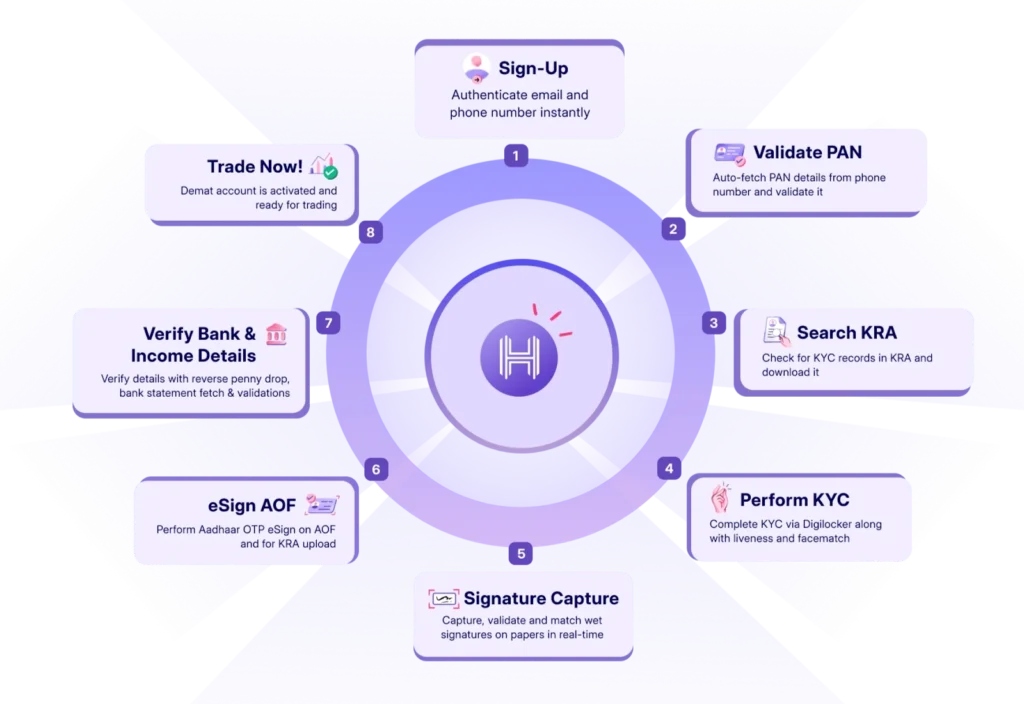As cops work under The Police Act, and doctors under the National Medical Commission, the mighty brokers and wealth managers need to abide by Securities and Exchange Board of India regulations.
Wealth tech companies operate within the periphery of various financial regulations. Among those regulations are the SEBI Listing Obligations and Disclosure Requirements (LODR) regulations. Introduced on December 1, 2015, these regulations build more transparency and compliance among listed companies in India.
For wealth tech companies, the LODR regulations impact operational integrity and investor trust. The best way to adhere to the regulations is by strengthening the Know Your Customer (KYC) and Anti Money Laundering (AML) norms. This way you protect investors and survive the competitive market. This is only a primer on the relationship between LODR and wealth tech companies, read this blog post till the end to get all the details.
Understanding SEBI LODR regulations
Before understanding what the LODR regulations mean for wealth tech companies, let’s build a solid understanding of their meaning and components.
What are SEBI LODR regulations?
The SEBI LODR regulations define requirements in three critical areas for Indian listed companies: disclosures, governance practices, and compliance with financial reporting standards. The goal is to maintain a high level of transparency in the company’s operations, financial health, and any significant event that can impact its stock prices.
The LODR regulations are equally applicable to public and private companies. They must publish detailed monthly and quarterly financial reports to keep the investors informed about the financial performance.
Core Components of LODR
Here are the three core components of LODR:
Disclosure obligations: Any significant event or information that could impact the company’s stock prices must be disclosed. For example, a listed company planning to acquire another organization must disclose this information to the stock exchange immediately after the board meeting.
Timing requirements: Listed companies must also adhere to timings for disclosing information. For example, according to the recent amendments on July 14, 2023, material events must be disclosed within 24 hours of occurrence.
Governance frameworks: The regulations also mention that companies must appoint compliance officers and auditing committees to build an internal governance structure.
How SEBI LODR Regulations Impact Wealth Tech Companies
The impact of SEBI LODR regulations on wealth tech companies can be divided into three sections: Regulatory compliance challenges, investor transparency, and board composition and governance.
Regulatory Compliance Challenges for Wealth Tech
The regulatory compliance challenges can be further broken down into risk disclosure, financial reporting, and governance structure.
Risk Disclosure: Wealth tech companies must disclose the risks associated with their investment products. It means explaining to the investors how market fluctuations can increase the risk of their investment resulting in financial loss.
Financial performance reporting: The other challenge for wealth tech companies is reporting their financial performance at specific intervals. This includes sharing the income, expenses, and other financial metrics necessary to maintain transparency with investors and regulatory bodies.
Governance structures: Governance structures ensure that the company adheres to ethical standards and complies with regulations. Wealth tech companies must establish internal controls and hire independent directors to build this structure.
Investor Transparency
Wealth tech companies must also align their business model with SEBI’s disclosure requirements to build investor transparency. They have to be proactive in sharing information related to fees, investment strategies, and performance metrics. For example, being transparent about the expense ratio of different mutual fund schemes builds trust with the investors and empowers them to make the right decision.
Board Composition and Governance
The SEBI regulations also emphasize the role of independent directors and audit committees in a wealth tech company’s board members.
Independent Directors: Independent directors are non-executive members meaning they don’t have a material relationship with the company. Their role is to monitor the accuracy in compliance with the regulations and oversee the internal controls to prevent fraud. They also provide direction to the management based on their experience and strategic insights.
Audit Committees: Audit committees consist of multiple independent directors. They work collectively to ensure compliance with the accounting standards. They also liaise with external auditors to conduct audits periodically and impartially.
In summary, the presence of independent directors and audit committees increases accountability and provides a more experienced perspective on governance issues.
How LODR Affects Onboarding and KYC Processes in WealthTech
The SEBI LODR regulations also influence KYC and AML practices in wealth tech companies. That means your digital process to onboard new investors must comply with regulations.
The Role of KYC in SEBI LODR Compliance
The KYC requirements under SEBI LODR mandate wealth tech companies to verify the identity of the investors. That means collecting essential information about them like name, address, date of birth, PAN, and Aadhar number. The regulations also push companies to keep the KYC information up-to-date and complete the process within a specific timeframe. For example, when a client opens a new investment account, the KYC verification process must be completed within 2 days.
AML (Anti-Money Laundering) in Wealth Tech
Wealth tech companies invest people’s money in different securities. If the source of funds is not accurately verified, they could be helping with money laundering inadvertently. To avoid that, the SEBI guidelines implement strong AML measures through these three steps broadly:
Customer due diligence: This involves scrutinizing the investor’s background and transaction history to create a risk profile. Clients with high risk might demand more extensive background checks.
Transaction monitoring: Wealth tech companies are also expected to keep a close eye on their client’s transactions. Anything unusual like a large amount of fund transfer from a client who has been making small transfers must be flagged and looked into immediately.
Reporting obligations: In case of any unusual activity, wealth tech companies must report such incidents to the Financial Intelligence Unit (FIU) under the Prevention of Money Laundering Act (PMLA).

Digital onboarding solutions
Digital onboarding solutions are tools that streamline the entire onboarding process while complying with the norms and regulations. Here are the three ways it makes a huge difference:
Instant identity verification: Digital onboarding solutions with advanced technologies like AI-powered facial recognition and document verification reduce onboarding time significantly. So your clients don’t feel like getting stuck in a long and cumbersome process which thereby decreases the drop-off rates.
Automate AML checks: Platforms like HyperVerge conduct AML checks against global watchlists and databases to confirm if the client poses a risk of money laundering or terrorist financing. This automation saves you hours and provides accurate details helping you to move much faster.
Ongoing monitoring: These platforms are also equipped with automatic monitoring features that alert you when a client performs suspicious activity post-onboarding.
Recent Amendments to SEBI LODR: Impact on WealthTech
SEBI introduced significant amendments to the LODR regulations in July 2023. These changes in the regulations were made to enhance corporate governance, transparency, and accountability among listed companies.
Overview of the recent changes
Here’s a quick overview of the amendments:
Enhanced disclosure standards: This amendment introduced disclosing material events taking place in the company or any such information related to corporate actions.
Reporting timelines: The timelines to report disclosures were significantly reduced:
- In the case of reporting material events, it must be done within 24 hours of occurrence
- If a listed company enters into a legal agreement, it needs to inform the exchange within 12 hours
Shareholder communication: Any special rights granted to shareholders must be approved through a special resolution at a general meeting every five years.
Addressing market rumours: If there is a rumour in the mainstream media with significant material information, then the listed company must deny, confirm or verify the rumour within 24 hours.
Adapting to new compliance standards
The new amendments will have an impact on a wealth tech company’s daily activities. Here are a few tips to help you adapt to these standards:
Update internal policies: Take a look at the existing internal policies and refresh them to comply with the regulations.
Invest in training: Keep your employees trained so they know how the amendments will impact their work. Your legal, compliance, and investor relations staff especially must be well-versed with the new laws.
Leverage technology: Use technology to keep track of material events and use automation to report them within the stipulated timeframe.
Engage with legal experts: Consult legal experts specializing in securities regulations to help you navigate complex compliance challenges.
The Role of Technology in Ensuring SEBI LODR Compliance
Technology holds the key to making compliance easy and less complex for wealth tech companies. We explore the exact role of technology in this section based on three points:
RegTech solutions for wealth tech
RegTech solutions are Regulatory Technology solutions with advanced Artificial Intelligence (AI) and Machine Learning (ML) capabilities. They solve two big challenges for wealth tech companies, automating compliance processes and enhancing data analysis.
It reduces the risk of oversight by staying updated with the latest amendments to the LODR regulations. The ML algorithm takes care of the data analysis as it analyzes vast amounts of data to identify patterns and report compliance issues in the case of anomalies. HyperVerge – awarded as the “Best-in-class RegTech Solution” – is a prime example of a RegTech solution that integrates with your current operations and constantly monitors compliance requirements to avoid issues.
Automation for financial disclosures
Automated systems ensure disclosures are done accurately and within the timeline. For example, it sends alerts to your compliance team when a disclosure is due so they don’t miss the deadline. It reduces errors in disclosures by pulling data from different sources and performing the calculations automatically.
Compliance dashboards
Compliance dashboards continuously monitor the compliance status of the company and offer insights about areas where immediate action is required. It also centralizes all the data at the time of preparing the reports saving valuable time otherwise spent on pulling the data from different sources.
Data Privacy and SEBI LODR
While the SEBI LODR regulations mandate disclosing details with the investors and stock exchange, wealth tech companies must also strengthen their data protection measures. We discuss a few ideas on how to balance both in this section of the blog.
Data protection requirements
Having clear policies for data collection, processing, and sharing is the right place to set strong data protection norms. This way wealth tech companies continue to collect crucial data from clients, adhere to the LODR regulations, and maintain the client privacy simultaneously. HyperVerge is a fitting example of a solution that helps wealth tech companies integrate data protection into the existing framework. It helps companies balance SEBI requirements with data protection laws.
Impact of data security on compliance
Using robust security measures is also part of data privacy. Wealth companies must set up strong security systems to avoid the breach of client’s financial data. One of the best ways of doing it is by encrypting the data. Encryption safeguards this data from cyber threats making it impenetrable for hackers. Moreover, using strict access controls will ensure that only authorized team members have access to the client’s sensitive information.
Role of identity verification in data privacy
The identity verification process confirms SEBI’s KYC requirements and ensures that data privacy is maintained. Wealth tech companies must resort to secure onboarding solutions that use biometric verification and secure document uploads to improve the security of the onboarding process.
Key Takeaways
The SEBI LODR regulations build the framework for wealth tech companies to comply with the disclosure requirements and reporting norms. Adhering to these regulations is building investor trust and market integrity.
Wealth tech companies must start setting up advanced KYC and AML processes and the best way to do that is by using RegTech solutions. These solutions enable continuous monitoring of the amendments and adapting to the reporting timelines.
HyperVerge is an advanced solution that offers customized solutions for wealth tech companies. It streamlines the KYC process, automates financial disclosures, and maintains compliance dashboards for real-time monitoring.
For more information on how HyperVerge can support your wealth tech business, visit the HyperVerge website today.
FAQs
1. What are SEBI LODR regulations?
The SEBI LODR regulations oversee the disclosure and compliance requirements for listed companies in India. The main objective is to build more transparency between the companies and investors and make the companies more accountable towards compliance norms.
2. How do SEBI LODR regulations impact fintech companies?
Fintech companies need to share financial information with the stock exchange and the investors on a timely basis. They also need to adhere to strict KYC and AML processes for identity verification and preventing money laundering.
3. What are the key amendments of SEBI LODR in 2023?
Enhanced disclosure standards, reduced reporting timelines, and strict rules regarding shareholder communication were the key amendments of SEBI LODR in 2023.
4. How can businesses use technology to stay compliant with SEBI LODR?
Businesses can use RegTech solutions like HyperVerge which uses AI and ML to automate compliance management. Automated reporting enhances the accuracy and timeliness of financial disclosures, while compliance dashboards enable real-time monitoring of regulatory obligations





